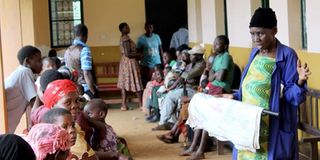Pain rural Bugisu women go through during pregnancy

Long queue. Pregnant women and mothers wait to be attended to at Bushika Health Centre III in Manafwa District recently. Many rural pregnant women in Bugisu sub-region trek long distances to get medical attention. PHOTO BY FRED WAMBEDE
What you need to know:
- Mr Bernard Masaba, a local leader, says for deliveries handled at health facilities during night, health workers have to use torches and candles for lighting as they are not connected to electricity.
- Ms Christian Kimiyu, a senior health officer from Sironko District, says most of maternal mortalities occur in the communities due to delay in reaching the health centre.
Mbale. When Agnes Namataka, 39, started experiencing labour pain, her relatives rushed her to Muyembe Health Centre IV in Bulambuli District, eastern Uganda, to deliver.
The facility is 15 kilometres away from her home.
But before they could get to the health centre, the pain intensified and the plans to seek proper medical attention were aborted as they opted for a traditional birth attendant (TBA).
“We were halfway when I stopped the boda boda rider because of the pain in my back and hips,” Ms Namataka, a resident of Bumugisha Parish, Sisiyi Sub-county in Bulambuli District, recalls.
Ms Namataka is not alone, as many pregnant women in rural areas encounter different challenges during pregnancy and delivery, according to Mr Bernard Buyi, the speaker for Bumugisha Sub-county.
“Some have died in [their] homes and others on their way to the health centres,” Mr Buyi says.
Expectant women who can afford to have TBAs attend to them at their homes incur extra costs.
However, some homes are unhygienic, which exposes mothers and newborns to germs and infections during delivery.
Pregnant women who want to deliver at Muyembe Health Centre have to part with between Shs20, 000 and Shs30, 000 for boda boda fares from their homes uphill to the health centre in the valley.
Many households in the sub-county do not have such an amount readily available. Such households carry the expectant women on locally-made stretchers to stages where they board commuter vehicles.
Mr Buyi accused the government of failing to prioritise health services in remote areas.
He says the only health centre III available does not have a maternity ward and a midwife besides constantly running out of drugs.
“How does the government expect our women in labour to travel such distances to deliver? We have cried out but no one listens,” he says.
Ms Sarah Nambozo, a resident of Wanale Sub-county in Mbale District, says the experience women go through while trying to access antenatal care and during delivery is unimaginable.
“Even the ambulances cannot be used here because of [the] bad roads. We have to walk for more than three kilometres before we can get transport to Mbale Town,” she says.
Mr Bernard Masaba, a local leader, says for deliveries handled at health facilities during night, health workers have to use torches and candles for lighting as they are not connected to electricity.
“The units have no reliable power supply. The leaders tell us that they have connected solar panels there but I have never found them working,” he says.
Mr Masaba revealed that many pregnant women now prefer TBA to health centres because of their convenience and affordability.
Ms Agnes Olam, the officer in-charge of Bumugisha Health Centre III, says there is need to equip the health facilities in hard-to reach areas.
Ms Olam says the facility she heads has one room, which serves as a delivery unit, immunisation room, laboratory, antenatal room, outpatient and tuberculosis ward.
Ms Sarah Nanyondo Okello, who works with Mbale Area Federation of Communities (MAFOC), says some health units have maternity wards, midwives, Mama kits, but operate without the officers in-charge.
“In some cases, health workers on duty who help mothers to deliver ask for money, especially at night. This has been reported at several heath centres,” she says.
The in-charge of Buteza Health Centre III, Mr Johnson Kageni, says due to transport challenges, many women fail to deliver from hospitals.
Ms Christian Kimiyu, a senior health officer from Sironko District, says most of maternal mortalities occur in the communities due to delay in reaching the health centre.




